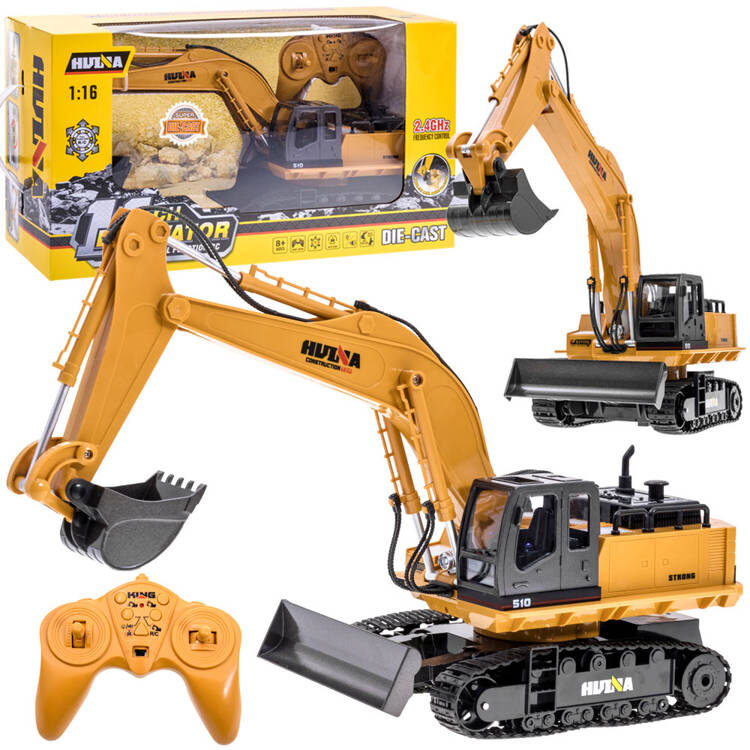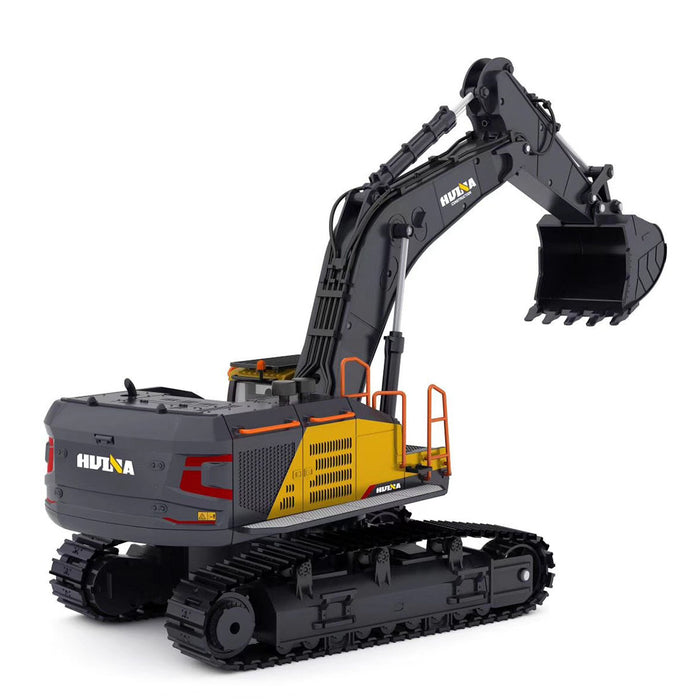How the Double E Volvo rc excavator Can Transform Your Construction Workflow
Understanding Just How Excavator Works and Its Effect on Performance
Excavators play a vital function in building and construction and mining procedures, relying upon a complicated interplay of mechanical and hydraulic systems. Their capability to perform a range of tasks depends upon both their design and the modern technology integrated within. Comprehending these parts can considerably impact operational performance and performance. As developments remain to reshape the sector, one need to consider just how these changes will affect future methods and performance.
The Basics of Excavator Mechanics

The Function of Hydraulic Equipments in Excavators
At the heart of excavator operation exists the hydraulic system, which plays a pivotal function in powering the maker's functions and movements. This system makes use of pressurized hydraulic fluid to transfer power, enabling various actions such as digging, moving, and lifting. By using the principles of hydraulics, excavators can carry out tasks with impressive precision and force, enhancing total operational efficiency.The hydraulic system contains key elements, consisting of valves, cylinders, and pumps, which collaborate to regulate the circulation and direction of the liquid. When the driver involves the controls, the hydraulic fluid is directed to specific cylinders, translating the driver's commands into physical activity. This mechanism enables smooth and receptive actions, which are vital in construction and excavation atmospheres. double e volvo rc excavator. The effectiveness of the hydraulic system directly influences the efficiency and adaptability of the excavator, making it an important component in modern excavation processes
Trick Parts of an Excavator
Recognizing the essential elements of an excavator is vital for grasping how this effective maker runs. An excavator is composed of several substantial aspects, consisting of the undercarriage, home, boom, bucket, and arm. The undercarriage supplies stability and movement, typically featuring wheels or tracks to navigate numerous terrains. The residence has the engine and hydraulic systems, permitting the operator to regulate motion and power the device. The boom expands from your home, making it possible for vertical reach, while the arm attaches to the container, facilitating digging and training operations.Additionally, the taxicab houses the operator, outfitted with controls for exact maneuvering. Each of these elements plays a vital role in the excavator's overall capability, adding to its effectiveness and effectiveness on building and construction websites. Understanding these parts assists in maximizing and keeping excavator efficiency, making sure tasks are completed securely and successfully.
Add-on Adaptability and Its Benefits
Accessory versatility is an essential facet of excavators, allowing drivers to switch over in between different tools tailored for certain jobs. This flexibility not only improves job efficiency however likewise adds to cost-effectiveness by minimizing the requirement for multiple equipments. Recognizing the different kinds of add-ons offered can greatly influence the general performance and functionality of an excavator on job websites.
Kinds of Attachments
While excavators are primarily recognized for their digging capacities, their true flexibility depends on the broad range of accessories readily available. These attachments boost the excavator's performance, enabling it to perform different tasks beyond excavation. Typical accessories consist of buckets (for excavating and scooping), hydraulic thumbs (for grasping materials), and augers (for piercing openings) Grapples are used for dealing with and relocating particles, while rippers can break up difficult surface areas. Various other specialized add-ons, such as plates and rakes, make it possible for excavators to adapt to details task requirements. This variety not only enhances the device's energy across various sectors, consisting of demolition, landscaping, and construction, however also allows operators to customize their equipment to fulfill particular job needs efficiently.
Boosted Job Efficiency
Maximizing work efficiency is a main advantage of utilizing various excavator attachments. Various add-ons allow an excavator to carry out numerous jobs without needing to change equipment, conserving important time and labor. For instance, utilizing a hydraulic hammer can break concrete while a pail add-on can dig deep into dirt, making it possible for a seamless process. This convenience decreases downtime associated with equipment adjustments and enhances performance on-site. In addition, specialized add-ons enhance accuracy in jobs such as grading or landscaping, causing better results. The capability to adapt to different task needs not only improves operations yet likewise reduces the need for extra machinery, ensuring that jobs are finished quickly and successfully. In general, attachment versatility substantially adds to increased job efficiency in excavation work.
Cost-Effectiveness and Flexibility
Cost-effectiveness is a substantial benefit of using flexible excavator add-ons. These attachments allow a single excavator to carry out several jobs, lowering the requirement for added equipment and labor - double e volvo rc excavator. By switching in between pails, hammers, and grapples, operators can tackle various jobs, from digging to demolition, consequently taking full advantage of equipment utilization. This adaptability not only lowers functional prices but additionally decreases downtime linked with changing devices. Additionally, the capacity to personalize excavators with specialized add-ons enhances performance, as they can successfully manage varied tasks according to job needs. To conclude, the mix of cost-effectiveness and versatility in excavator add-ons adds to enhanced functional efficiency and source allotment in building and excavation jobs

Advanced Modern Technology in Modern Excavators
Modern excavators are significantly furnished with innovative innovation that changes excavation processes. Automation streamlines procedures, while boosted fuel effectiveness reduces operational prices. In addition, clever control systems boost accuracy and safety, marking a substantial evolution in excavation tools.
Automation in Excavation Processes
As excavation technology evolves, automation has become a vital component in improving efficiency and precision on task sites. Modern excavators are geared up with innovative automated systems that promote tasks such as grading, digging, and trenching with marginal driver intervention. These systems utilize sensors, GPS, and artificial intelligence formulas to ensure exact placing and deepness official statement control, substantially decreasing the margin for mistake. Furthermore, automation allows operators to concentrate on critical decision-making as opposed to hand-operated controls, leading to enhanced productivity in general. Such developments not only you can look here streamline workflows yet also boost safety and security by minimizing human mistake in complicated operations. As a result, the integration of automation in excavation procedures stands for a substantial advancement in building modern technology, driving the market towards greater performance and performance.
Improved Fuel Effectiveness
Advancements in technology have likewise led to significant enhancements in fuel efficiency for modern excavators. Modern equipments are outfitted with advanced engines that maximize power output while decreasing fuel intake. These engines utilize innovative burning innovations, such as turbocharging and straight fuel injection, to boost performance and performance. In addition, lightweight materials in building and construction reduce general weight, enabling for less energy expenditure during operation. The introduction of variable rate controls enables drivers to adjust engine efficiency according to specific jobs, even more reducing gas usage. Therefore, these improvements not only reduced functional costs but likewise add to environmental sustainability by reducing discharges. In general, boosted gas effectiveness in excavators is a vital growth that strengthens efficiency and financial practicality in the building sector.
Smart Control Systems
While drivers navigate progressively complicated job sites, wise control systems in excavators have become important devices for improving performance and accuracy. These sophisticated innovations use formulas and sensors to keep track of different specifications such as tons weight, surface conditions, and functional efficiency. By instantly changing hydraulic features, clever systems maximize device performance, causing improved productivity and decreased wear on components. Additionally, drivers profit from intuitive interfaces that offer real-time feedback and diagnostics, enabling informed decision-making. This combination of innovation not only enhances operations however additionally reduces human mistake, look at here now contributing to more secure workplace. As the construction market continues to progress, smart control systems will certainly play an important role in shaping the future of excavator efficiency and effectiveness.
Enhancing Functional Effectiveness With Excavators
Excavators play an important duty in improving operational efficiency across various building and construction and excavation projects. Their convenience enables multiple jobs, consisting of product, digging, and lifting handling, which improves operations and minimizes the need for additional equipment. With effective hydraulic systems, excavators can do sturdy tasks with accuracy, significantly reducing the moment called for to full projects. The integration of sophisticated innovation, such as general practitioner and automated controls, better optimizes their procedure, making it possible for drivers to attain greater precision and decrease product waste. Furthermore, modern-day excavators are created to consume less gas and lessen exhausts, adding to both price savings and environmental sustainability. By using excavators properly, construction groups can improve performance, satisfy job target dates, and improve overall website management. This multifunctionality and performance make excavators crucial devices in the contemporary construction landscape.
The Future of Excavators in Building And Construction and Mining Industries
As the construction and mining markets develop, the future of excavators is positioned for significant change driven by technical development and transforming operational needs. Advancements in automation and expert system are reshaping excavator capacities, allowing for improved accuracy and efficiency in procedures. Autonomous excavators are arising, minimizing the requirement for human treatment and minimizing the danger of accidents.Moreover, the combination of telematics and IoT technology makes it possible for real-time surveillance of machine efficiency and anticipating maintenance, maximizing uptime. Green layouts, including hybrid and electrical designs, are acquiring grip, straightening with sustainability goals within the industry.Additionally, the use of sophisticated materials and lighter layouts enhances fuel effectiveness while maintaining performance standards. As these fads development, excavators will certainly play a crucial function in meeting the raising needs for performance and safety and security in construction and mining, ultimately changing operational landscapes.
Regularly Asked Concerns
Exactly How Do Weather Conditions Affect Excavator Efficiency?

Climate problems considerably affect excavator performance, as rain and mud can impede grip and security, while extreme temperatures may affect hydraulic systems. Operators has to adjust to these variables to ensure optimal capability and security during procedures.
What Precaution Should Operators Follow While Utilizing Excavators?
Safety procedures for excavator drivers include wearing appropriate individual safety tools, conducting pre-operation examinations, guaranteeing correct interaction with ground workers, keeping a secure range from overhead threats, and sticking to recognized operational procedures to avoid crashes.
Just How Often Should Excavators Be Kept for Ideal Efficiency?
Excavators ought to be maintained on a regular basis to guarantee peak performance, typically every 250 operating hours or as specified by the maker. Regular checks boost integrity, avoid unanticipated breakdowns, and prolong the lifespan of the tools.
What Is the Ordinary Life Expectancy of an Excavator?
The ordinary life-span of an excavator typically ranges from 10,000 to 15,000 hours of operation. Elements affecting longevity consist of upkeep practices, operating conditions, and the top quality of the maker itself, influencing total efficiency and performance.

Can Excavators Operate Irregular Terrain Properly?
Excavators can operate properly on uneven terrain because of their articulated styles and flexible tracks. These functions enable them to keep security and traction, enabling effective operation in difficult atmospheres typically run into in building and construction and landscape design jobs. Each of these components plays an essential role in the excavator's general functionality, contributing to its effectiveness and effectiveness on building and construction sites. Optimizing work efficiency is a key advantage of making use of different excavator attachments. While drivers browse increasingly intricate job websites, wise control systems in excavators have emerged as essential devices for enhancing performance and precision. Excavators play a crucial function in boosting functional efficiency across different building and construction and excavation jobs. Developments in automation and artificial intelligence are reshaping excavator capabilities, enabling for enhanced precision and performance in procedures.